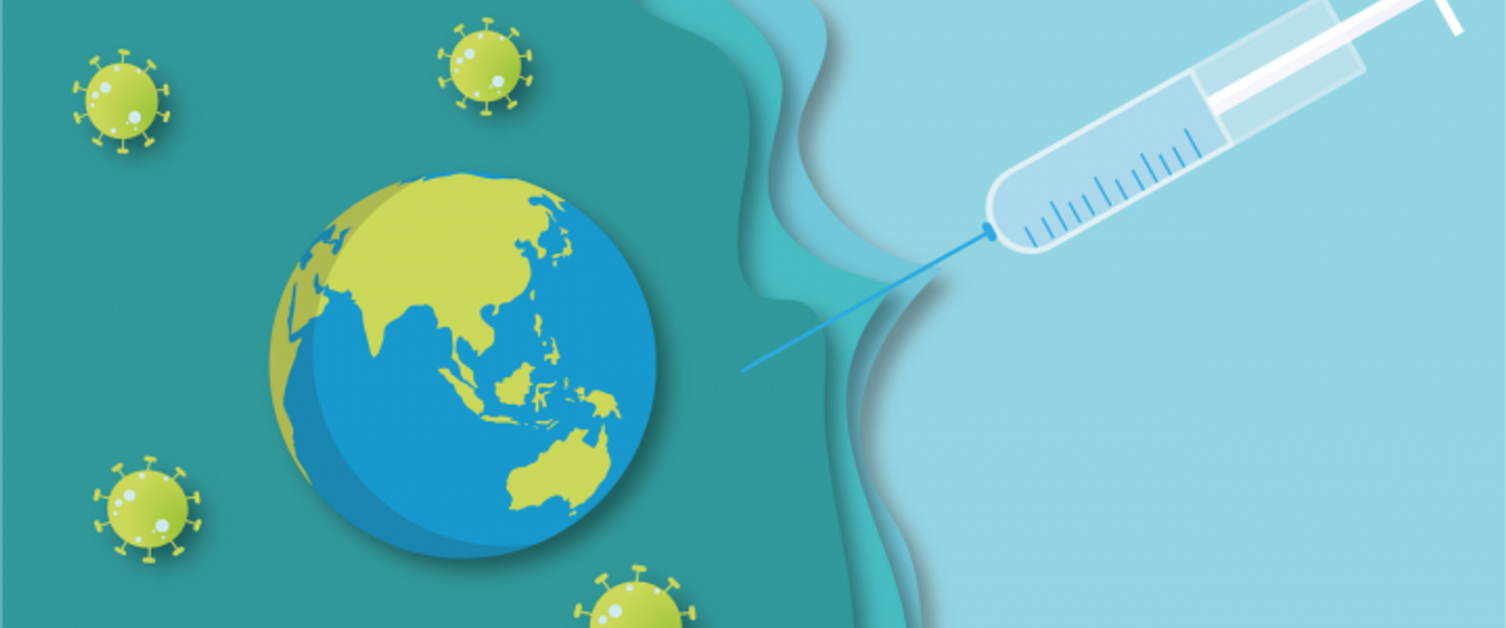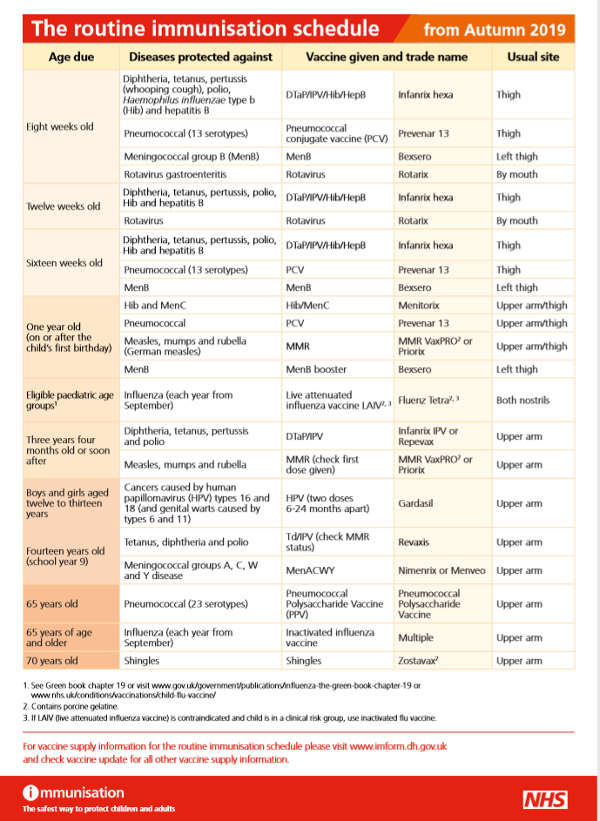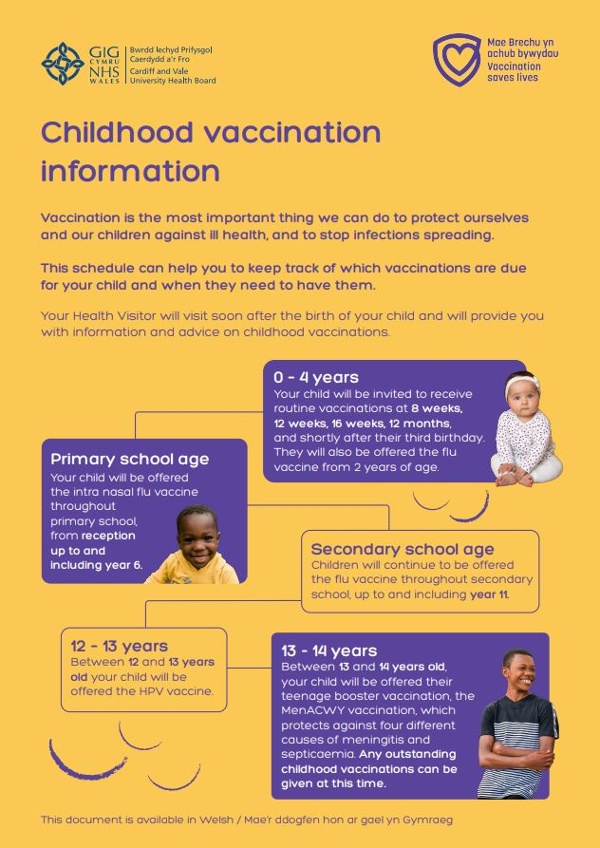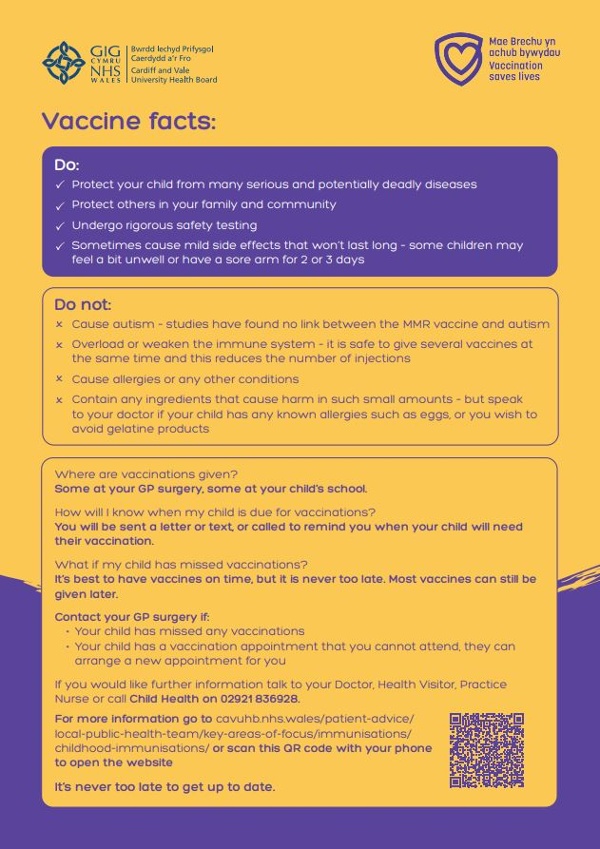Vaccinations

Vaccinations
Vaccination is one of the most important thing we can do to protect ourselves and our children against ill health. They prevent up to 3 million deaths worldwide every year.
Since vaccines were introduced in the UK, diseases like smallpox, polio and tetanus that used to kill or disable millions of people are either gone or seen very rarely. Other diseases like measles and diphtheria have been reduced by up to 99.9% since their vaccines were introduced.
However, if people stop having vaccines, it's possible for infectious diseases to quickly spread again. Vaccines teach your immune system how to create antibodies that protect you from diseases.
It's much safer for your immune system to learn this through vaccination than by catching the diseases and treating them. Once your immune system knows how to fight a disease, it can often protect you for many years.
Having a vaccine also benefits your whole community through "herd immunity". If enough people are vaccinated, it's harder for the disease to spread to those people who cannot have vaccines. For example, people who are ill or have a weakened immune system.
Childhood Vaccination Programme
One of the best ways to protect your child against diseases like measles, rubella, tetanus and meningitis is through immunisation. Your child needs their first injections at eight weeks, then 12 weeks, 16 weeks and one year. Booster vaccines will be offered again at 3 years and 13 years of age, as per the vaccination schedule below.

Vaccinations are offered free of charge in the UK – just book your appointments with your GP. Remember, as well as protecting your own child, you're also protecting other children by preventing the spread of disease.
You will be invited to attend an appointment at your GP surgery when they are due for their vaccines. If your child missing their vaccination they will be invited again. You can book their appointment any time after the date that they are due.
More information about the Routine Immunisation Schedule for children can be found here.


Unscheduled Immunisations
It is important that vaccines are given on time for the best protection. If you have missed a vaccine, or recently been invited for one, please book an appointment with one of our practice nurses.
Adults eligible for unscheduled immunisations, for example Pneumococcal (PPV), Shingles, Pertussis (pregnant women) etc are invited based on their age group and assessment of risk.
A shingles vaccine is routinely offered to everyone aged 70 to 79 years of age. Individuals become eligible on their 70th birthday and remain eligible until their 80th birthday. Some people under 70 who are at high risk of developing shingles may also be offered the vaccine by their doctor. Read more about who can have the shingles vaccine.
The pneumococcal vaccine (pneumonia vaccine as it's also known) protects against pneumococcal infections. People over-65 only need a single pneumococcal vaccination, which will protect for life. People with a long-term health condition may need just a single one-off pneumococcal vaccination or five-yearly vaccination depending on their underlying health problem. Read more about why the pneumococcal vaccination is needed.
Vaccines for special groups
There are some vaccines that aren't routinely available to everyone on the NHS, but that are available for people who fall into certain risk groups, such as pregnant women, people with long-term health conditions and healthcare workers.
Additional ones include hepatitis B vaccination, TB vaccination and chickenpox vaccination.
Annual Seasonal Influenza Vaccination
A free NHS flu vaccination is available every year to people at risk of becoming very ill with flu and those who take care of them, to protect against flu and it's complications.
Flu can be very serious. Like COVID-19, it is caused by a virus and it can lead to illnesses such as bronchitis and pneumonia, which may need treatment in hospital. There are outbreaks of flu most winters, especially in hospitals and care homes. In a normal winter, thousands of people will die from flu-related illnesses in the UK.
Having a flu vaccine every year is one of the best ways to protect against flu. Flu vaccines are quick and very safe, and could prevent weeks of serious illness. Flu vaccines usually become available towards the end of September each year. Ideally, you should have your flu vaccine before flu starts to circulate, which is usually not before mid-December. You can have it later, but having it before flu circulates is best. It takes between 10 and 14 days for your body to build up protection after you have had a flu vaccine.
If you are in a group that is at increased risk of becoming very ill if they catch flu, you should have a flu vaccination every year. If you are eligible you will be invited directly by your GP surgery to attend an appointment. Weekend and evening clinics are also often available. Some Pharmacies offer a vaccination service by appointment, although this may incur a charge.
https://www.nhs.uk/.../vaccinat.../flu-influenza-vaccine/...
Flu vaccine and coronavirus (COVID-19)
Flu vaccination is important because:
- more people are likely to get flu this winter as fewer people will have built up natural immunity to it during the COVID-19 pandemic
- if you get flu and COVID-19 at the same time, research shows you're more likely to be seriously ill and may require admission to hospital for treatment
- getting vaccinated against flu and COVID-19 will provide protection for you and those around you for both these serious illnesses
If you've had a confirmed COVID-19 infection, it's safe to have the flu vaccine. It will still be effective at helping to prevent flu.
It is important you go to your vaccination appointments unless you or someone you live with has symptoms of COVID-19 or are awaiting the outcome of a test result.